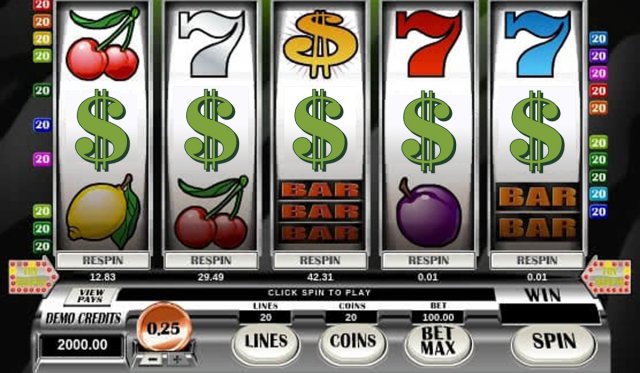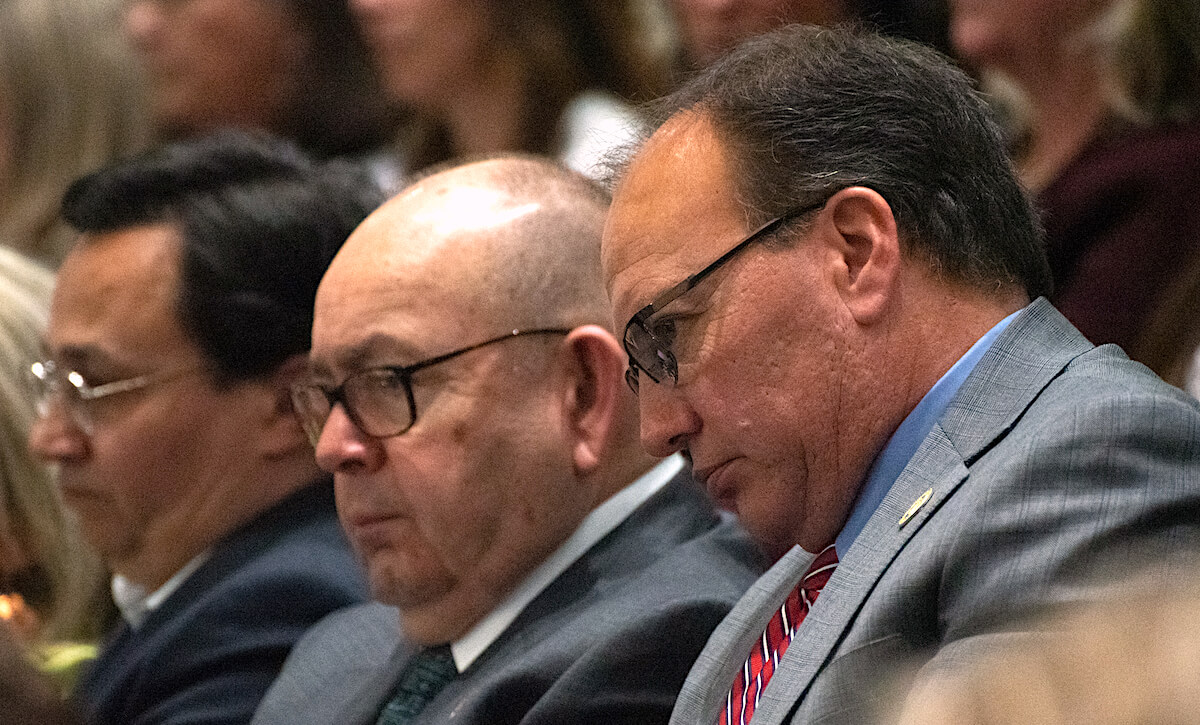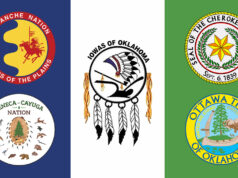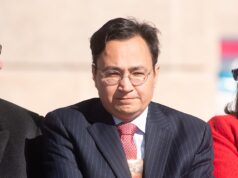

(Editor’s note: To stay apprised of more recent articles about tribal gaming in Oklahoma, follow NonDoc on Facebook, Twitter or via newsletter.)
Attorneys representing the state of Oklahoma have sent a new 15-year gaming compact proposal to at least six tribal nations: the Fort Sill Apache Tribe, the Miami Tribe of Oklahoma, the Ottawa Tribe of Oklahoma, the Pawnee Nation of Oklahoma, the Seneca-Cayuga Nation and the Wyandotte Nation. Other tribes with modest casino operations are also believed to have received the new gaming compact proposal.
The tribes with the largest gaming operations in Oklahoma — the Chickasaw, Choctaw and Cherokee nations who filed a lawsuit against Gov. Kevin Stitt arguing that the existing Model Tribal Gaming Compact automatically renewed Jan. 1 — do not appear to have received the same compact offers, although ongoing mediation between the state and those tribes involves the trading of proposals.
Dated March 24 and delivered by the law firm Lytle, Soulé & Felty, the new gaming compact offered to smaller tribes would feature either a flat 5 or 6 percent exclusivity fee on machine and table games, a new definition relating to vendor fees, a new arbitration clause and one license for sportsbook gambling per tribe with a 2 percent fee for partial exclusivity. (Sports betting would need to be authorized by the Oklahoma Legislature, whose leaders have expressed a desire to consider the issue once Stitt and tribes can agree on the compact situation.)
Currently, all tribes compacted for gaming in Oklahoma pay a staggered exclusivity fee on machine gambling between 4 percent and 6 percent, depending on revenues. House-banked table games such as blackjack, poker, craps and roulette are currently subject to a 10 percent exclusivity fee, but under the new proposal to smaller tribes those games would be subject to only a 5 or 6 percent fee.
NonDoc obtained a copy of Oklahoma’s new gaming compact proposal (embedded below) as well as an email sent to tribes March 26 by Matthew Morgan, chairman of the Oklahoma Indian Gaming Association. He said OIGA surveyed tribes about whether they had received new gaming compact offers. Among 25 tribes who responded, six said they had, according to Morgan’s email.
“To my knowledge, none of these tribes solicited these offers or understand why/how they were selected to receive the offers. Additionally, we don’t know if others may receive these gaming compact offers in the coming days,” Morgan wrote. “While the compact offers are specific to each tribe by name, they appear to be identical in terms.”
Morgan is also director of gaming affairs for the Chickasaw Nation, which operates what is, by far, the largest gaming operation in Oklahoma under the branding Global Gaming Solutions. With more than $1.4 billion in gaming revenue from across the United States, the Chickasaw Nation’s gaming arm has built national industry leverage. But the Chickasaw Nation has also received scrutiny for aggressive growth efforts and controversial federal regulatory decisions that affect less affluent tribes with smaller casino operations, such as the Comanche Nation.
Add in discussion about the Chickasaw Nation’s connections to the slot machine financing company Gaming Capital Group — which lists 23 other Oklahoma tribes as “valued clients” of its numerous subsidiaries — and the Stitt administration’s new compact offer to smaller tribes matches one of the governor’s key talking points throughout 2019’s political posturing: market share matters, and smaller tribes are not always receiving a fair shake.
“One thing is abundantly clear from our negotiations,” Stitt said at a Dec. 17 press conference. “The needs of the Oklahoma tribes are not united. Contrary to what the TV commercials and some of the newspapers are reporting, the tribes are not united on this issue.”
RELATED
Why Oklahoma’s gaming compact dispute never went to arbitration by Tres Savage
Two days later, however, more than 50 representatives of more than 30 tribes filled a Tulsa casino for their own press conference to refute Stitt’s claim. Wyandotte Nation Chief Bill Friend spoke on behalf of nine tribes whose nations exist within Ottawa County in far northeast Oklahoma: the Cherokee, Eastern Shawnee, Miami, Modoc, Ottawa, Peoria, Quapaw, Seneca-Cayuga, and Wyandotte tribes.
“The nine tribes in northeast Oklahoma, we’ve been unified on this issue ever since we received the letter in July from Gov. Stitt,” Friend said Dec. 19. “That unity among us has not faltered since. The nine tribes are the largest employer in northeast Oklahoma.”
Now, Friend’s tribe and others in his region are left to ponder Stitt’s new gaming compact offer while their largest regional ally — the Cherokee Nation — has not been offered the same deal. Calls to the Wyandotte Nation and other tribes who received the new gaming compact proposals went unanswered before the publication of this story.
“The Cherokee Nation cannot comment on the gaming compact mediation,” said Julie Hubbard, the tribe’s external director of communications.
OIGA asks ‘that no tribe take any action’ without group discussion
The Stitt administration also declined to answer questions about which tribes it sent new gaming compact proposals to or why the offers were made now. But Stitt’s communications director, Baylee Lakey, did offer a statement to NonDoc.
“Since day one, the governor has been committed to negotiating with every tribe in Oklahoma, no matter a tribe’s size or location, to achieve a win-win for the future of tribal gaming in our state,” Lakey said. “Despite what an association may claim, the state has been aggressively communicating with every tribe in Oklahoma to advance a common-sense solution on Model Gaming Compacts. We cannot comment on the details of compact negotiations while engaged in court-ordered mediation, which is still ongoing.”
Throughout 2019, Morgan and other tribal representatives said they would welcome a specific proposal from the Stitt administration, once the governor conceded that the original Oklahoma Model Tribal Gaming Compact automatically renewed Jan. 1. The Stitt administration disagreed and made its own claims that they were not allowed to present their proposals to tribes at a meeting in Shawnee.
RELATED
From sovereignty to sportsbook: Gaming negotiations affect ‘shared citizenry’ by Tres Savage
Asked to comment on the Stitt administration’s decision to send new gaming compact proposals to tribes with smaller casino operations, Morgan responded with a statement in his capacity as chairman of the Oklahoma Indian Gaming Association.
“We are disappointed in the action taken by Gov. Stitt through one of his attorneys to take advantage of tribes as they focus on protecting their tribal citizens and non-tribal citizens during this pandemic,” Morgan said. “Perhaps more than anything, though, we are dismayed Gov. Stitt would exploit the current pandemic for these purposes. Consistent with the advice of public health professionals, the tribal governments have suspended gaming operations to help blunt the spread of COVID-19. Nothing is more important to the Tribes than working together to fight this deadly virus. Public health is our main focus at this time.”
In his statement, Morgan referenced the letter sent by attorneys, but not the compact proposal or its specific conditions.
“The tribes that received the letter are outside of the litigation and mediation. This letter is yet another unsuccessful attempt to divide the tribes,” Morgan said. “The letter confirms the real intent of Gov. Stitt is to destroy the tribal interest outlined in the existing compacts. The tribal leaders who received the letter reject the proposal as disrespectful and disingenuous.”
Asked the Chickasaw Nation’s response to the proposal, Morgan said he could not speak on behalf of the Chickasaw Nation.
In his March 26 email to other OIGA members, Morgan called for unity among all of the tribes engaged in gaming in Oklahoma.
“Again, we do ask that no tribe take any action until we can have a tribal leaders discussion with everyone,” Morgan wrote. “The Unity of this group has served us all well and I believe will be of even greater benefit in the weeks and months ahead.”
Other elements of the new gaming compacts proposed by the Stitt administration include:
- Page nine: a requirement that at least 50 percent of machine gaming revenue come from Class III machines. (Class II machines are not subject to fees.)
- Page 12: notification requirements for casino locations.
- Page 13: compliance with federal and state health standards, particularly concerning declared states of emergency.
- Page 21: annual state oversight assessment fees ranging from $25,000 for a tribe with up to $15 million in annual gaming revenue to $250,000 for a tribe with more than $750 million in annual gaming revenue.
Background on state-tribes lawsuit mediation
Judge Timothy DeGiusti of the U.S. District Court for the Western District Court of Oklahoma is presiding over the lawsuit against Stitt regarding renewal of the original Oklahoma Model Tribal Gaming Compact, which he ordered for mediation Feb. 10.
That mediation has been ongoing and was initially ordered to be completed or substantially completed by March 31, but on March 17 DeGiusti extended that date to May 31 owing to the COVID-19 pandemic.
The plaintiffs currently involved with the lawsuit and mediation are the Cherokee Nation, the Choctaw Nation, the Chickasaw Nation, the Citizen Potawatomi Nation, the Muscogee (Creek) Nation, Quapaw Nation, the Delaware Nation, the Oteo-Missouria Tribe, the Comanche Nation, the Seminole Nation of Oklahoma and the Wichita and Affiliated Tribes.
Read Oklahoma’s gaming compact offer to smaller tribes
 Loading...
Loading...
(Correction: This story was updated at 4:10 p.m. to note variation in the proposals sent to tribes with smaller gaming operations and to include additional information.)






















